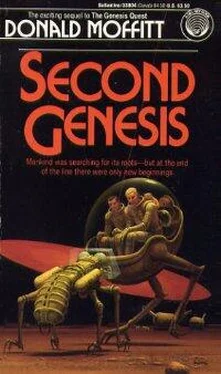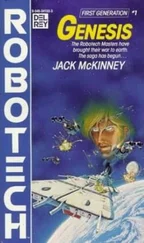He trailed off, looking thoughtful.
The tree continued to accelerate. One of the women with the hysterical man said soothingly, “See, we’re still going.”
“The sensitive part of the ramjet shaft’s in the umbrage of the leaves at this angle,” Jun Davd said. “And as for the leaves themselves, our sensors haven’t yet detected any fires.”
He was trying to suppress a smile. He gave up the effort and let his long face split in a big grin.
Bram took the call from Smeth when it came. He listened briefly, then hung up and addressed the expectant throng.
“Smeth wanted to warn us that we’re all a few pounds heavier—but I’m sure you’ve all noticed that already. The laser beams are giving us a small additional boost—enough to take a little of the load off the ramjet and turn more of its work into acceleration.”
A few of the people looked puzzled. Bram drew a breath and said, “Yggdrasil thrives on light. Up to and including x-rays—the Nar found space trees happily in orbit around x-ray stars.”
He added his own grin to Jun Davd’s. “When Yggdrasil felt things getting a little too hot, it turned its leaves reflective side out, in the lightsail mode. The dragonflies will take a while to realize it, but they’re helping to speed us out of their system.”
An hour later, they watched the second fleet of dragonfly ships fall into the consuming flame of the drive beam. Long before then, the lasers had been switched off.
As Yggdrasil sped past the orbit of the planet that had been called Pluto, Jun Davd sought Bram out during an intermission at one of Edard’s concerts. It was a Tenday later, and life in the tree was returning to normal. “The next time we meet them,” Jun Davd said, “they may be more advanced.”
“Then we’ll have to go far enough to be sure we won’t meet them,” Bram said.
Jun Davd did not reply directly. “Trist is looking for volunteers to help repair the antenna system,” he said.
“What’s the hurry? We don’t have a Message to broadcast anymore.”
“No. But we’d better start listening.”
Seven years of listening had taken their toll on Trist. He had the same ready smile, the same willingness to banter. But his ice-blue eyes had acquired something of the haunted look that Bram remembered from the years when Trist had monitored the spread of Nar civilization through the Whirlpool galaxy—until the wave of radiation from the exploding core had put a stop to the radio emissions forever.
Trist had monitored the Nar emissions for fifty thousand years. He had listened to the spread of dragonfly civilization for only fifty-odd years—about seven years in terms of tree time. But his eyes had aged at the same rate as the outside universe, Bram thought.
Trist looked up from his console as Bram entered the control booth. The Message Center had been stripped of its library over the centuries, as the archivists had gradually integrated its contents with the growing central databank. But its equipment—the leaning stacks of power and control elements that made long avenues down the cylindrical cavity—had been left intact and placed at the service of the astronomy department.
“They’ve reached Aldebaran now,” he said before Bram could speak.
“Red giant,” Bram said, searching his memory. “With a companion.”
“It’s a white dwarf now,” Trist said. “The dragonflies have settled both components. They’re not very fussy. Outer planets of the dwarf would be pretty cold but that wouldn’t bother the kind of creatures who settled Pluto. Any inner planets, if they survived the red giant phase and resolidified, wouldn’t be much more habitable. Airless slagballs.”
“How far?” Bram asked.
“About sixty light-years from Sol. It was one of the stars that stayed in the same neighborhood.”
A crawling sensation went down Bram’s spine. “Their technology’s improving. They’re spreading outward at about half the speed of light.”
Trist nodded. “Since we first met them at Delta Pavonis, the sphere of space they occupy has grown to a diameter of nearly one hundred twenty light-years. At this rate, it will take them only two hundred thousand years to overrun the entire galaxy.”
“Jun Davd said that we could flee to the opposite ends of the Milky Way and find them waiting for us.”
“If they learn how to attain relativistic speeds any time in the next few centuries, yes.” Trist was gloomy. “And if they don’t, they could come calling fairly soon, anyway.”
“The nearest large galaxy is two million light years away. Andromeda, former man called it.” Bram swallowed hard as he remembered the first breathtaking sight he’d had of the Milky Way’s sister galaxy, centuries ago, as a child at the observatory with Voth. “At one g, we could be there in thirty years, our time.”
“Two million years, dragonfly time,” Trist said. “Plenty of time for them to invent relativistic ramjets. And improve on them.”
“Yes,” Bram said. “And intergalactic beacons that broadcast their genetic code. They’re already in possession of the prototype.”
“We’re using frozen Nar technology for the most part,” Trist said. “We won’t have a better intergalactic machine till we’ve settled down somewhere, expanded our population, developed an industrial-based society—”
“While the dragonflies have had two million years to develop theirs.”
Trist spoke with a sort of controlled terror. “Long before then, they’ll have swallowed the entire Milky Way. Trillions of them around every G-type and K-type star. Billions, maybe, around less hospitable stars … And … two hundred billion stars! Two hundred billion separate dragonfly civilizations, all of them competing to be the first for the next leap outward.”
“Jun Davd was right,” Bram said. “All they have to do is to learn to crowd the speed of light by one decimal place better than we can.”
He turned to listen for a moment to the speakers, which were pouring out a torrent of dragonfly clicks and snaps from whatever lumps of rock were in orbit around Aldebaran and its companion. When he spoke again, it was half to himself.
“There’s no place we can go in the entire universe where we’d be safe from them. No place at all.”
Both of them listened to the clicks for a while. Then Trist spoke. “You’d better call a ship’s meeting.”
“I’m not year-captain.”
Trist showed rare exasperation. “Oh, for Fatherbeing’s sake, by the time we get Smeth to do it and wait for him to sort out all the ifs, buts, and maybes, the dragonfly sphere will be another fifty light-years across!”
“I’ll post a notice in the datanet,” Bram said.
“I say we go back!” the man on the holo stage bleated. “Go back and sterilize all their worlds with our engine exhaust! All of them, down to the smallest asteroid! That’s the only way we’ll ever be safe?
He was a narrow-faced man with an incongruously thick and muscular neck sticking up out of protective coveralls, and his voice was shrill with fear.
“Who is he?” Bram whispered to Trist in the seat next to him.
“Name’s Perc. He’s one of Smeth’s technicians. Fusion specialist, I think. Big talker—always trying to organize the black gang, whatever that means. He’s always at loggerheads with Smeth.”
“The way to do it,” Perc blathered on, “is to start back far enough to build up a tremendous gamma factor. Build up enough relativistic mass so that we devastate them by gravitational effects, too, just to make sure. But the main thing about going in at relativistic speeds is that we can flash by in fractions of a second, before they have time to react. They might not even realize we were there, in fact. To them it would just seem as if the surface of their planets just sizzled and went up in flame.”
Читать дальше












